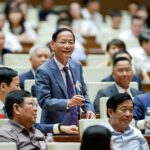
SSI Chairman Nguyen Duy Hung shared a notable post on his personal Facebook page.
In the context of Vietnam’s dynamic economic transformation, the private sector is increasingly asserting its important role. The Resolution 68/NQ-TW of the Politburo on private sector development sets unprecedented goals, views, tasks, and breakthrough solutions, shaping the Party’s new perspective on private sector development in a socialist-oriented market economy under the management of the State and the leadership of the Party.
Resolution 68 sets the goal that by 2030, the private sector will be the most important driving force of the national economy; it will be the pioneer in scientific and technological development, innovation, and digital transformation, contributing to the successful implementation of Resolution 57-NQ/TW dated December 22, 2024, and other guidelines and policies of the Party.
We aspire to have 2 million businesses operating in the economy, with 20 businesses per thousand people. At least 20 large enterprises will participate in the global value chain.
The average growth rate of the private sector is expected to reach approximately 10-12%/year, outpacing the economy’s growth rate. It will contribute about 55-58% of GDP, about 35-40% of the total state budget revenue, and provide jobs for about 84-85% of the total labor force. Labor productivity is expected to increase by an average of 8.5-9.5%/year.
In terms of technology, innovation, and digital transformation capabilities, Vietnam aims to be among the top 3 countries in ASEAN and the top 5 in Asia.
Looking ahead to 2045, the resolution envisions a fast-growing, robust, and sustainable private sector in Vietnam that actively participates in global production and supply chains. It aims to have highly competitive enterprises in the region and internationally, striving to have at least 3 million businesses operating in the economy and contributing over 60% of GDP by 2045.
The National Assembly has issued Resolution No. 198/2025/QH15 dated May 17, 2025, on special mechanisms and policies to develop the private sector, with key contents including improving the business environment, supporting access to land and production facilities, providing financial and credit support, promoting science, technology, innovation, digital transformation, and human resource training, and facilitating the formation of medium and large enterprises, as well as pioneer enterprises.
On the same day, May 17, 2025, the Government promptly issued Resolution No. 139/NQ-CP on the plan to implement Resolution No. 198/2025/QH15 of the National Assembly. This resolution assigns specific tasks and timelines to ministries, agencies, and localities to ensure effective implementation from the time of issuance.
Let’s Get Rich: The Prime Minister’s Call for a National Movement to Prosper
“At the National Conference on the implementation of Resolution 68, the Prime Minister emphasized the need to dismantle prejudices and recognize the private sector as the most important pillar and driving force of the economy. He stressed the importance of vigorously promoting a culture of entrepreneurship, innovation, and international integration.”
The Power Dialogue: A Summit with the Prime Minister and Business Leaders
On the morning of May 18, at the conference to propagate and implement Resolution 68 of the Politburo on private economic development, in the presence of the highest-ranking leaders of the Party and State, Prime Minister Pham Minh Chinh directly exchanged and addressed a number of opinions and proposals from leaders and representatives of the private business community.
“Overcoming Challenges: Unleashing the Potential of Vietnam’s Private Sector”
“During the National Conference on May 18, Prime Minister Pham Minh Chinh pointed out a slew of shortcomings hindering the development of the private sector, ranging from institutional and cognitive aspects to implementation. Despite accounting for 50% of GDP, this sector still faces a “double bind” in terms of legal framework, credit, and connectivity.”





















